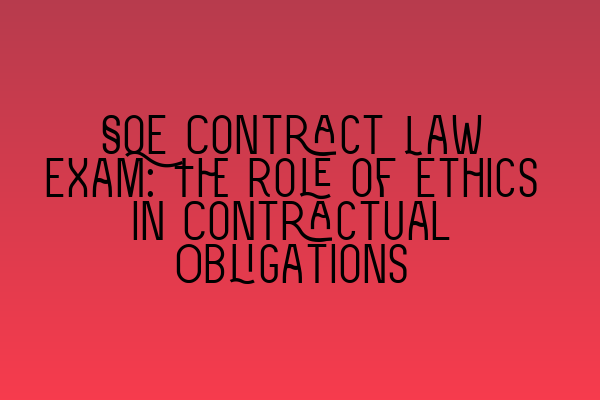SQE Contract Law Exam: The Role of Ethics in Contractual Obligations
Introduction:
In the realm of contract law, understanding the role of ethics in contractual obligations is of utmost importance. As a future solicitor, it is crucial to comprehend the ethical responsibilities that come with entering into legally binding agreements. The Solicitors Qualifying Exam (SQE) Contract Law Exam tests candidates’ knowledge of these ethical principles and their application in contractual relationships. In this blog post, we will delve into the significance of ethics in contractual obligations, exploring key concepts and providing practical insights.
1. Ethical Considerations in Contracts:
Contracts are more than mere documents outlining parties’ rights and obligations. Ethical considerations play a vital role in shaping contractual relationships. A solicitor must ensure that the terms and conditions of a contract are fair, just, and comply with legal and ethical standards. This includes avoiding deceptive practices, negotiating in good faith, and promoting equality and fairness between parties.
2. Honesty and Good Faith:
Ethics demand a high level of honesty and good faith in contractual negotiations and performance. Parties to a contract should be transparent and truthful in their dealings, fostering an environment of trust and reliability. This principle reinforces the importance of acting honestly and with integrity, even when faced with difficult circumstances or potential conflicts.
3. Confidentiality and Privacy:
Ensuring confidentiality and privacy is essential in contractual relationships. Solicitors must adhere to their duty of confidentiality and protect sensitive information shared by clients during the course of contract negotiation or execution. Confidentiality supports trust between solicitors and clients, safeguarding their interests and promoting a secure environment for effective contractual collaboration.
4. Professional Competence and Duty of Care:
Contractual obligations extend to a solicitor’s professional competence and duty of care. Solicitors must possess the necessary legal knowledge and skills to provide sound advice and guidance to their clients. This involves staying up-to-date with legal developments and industry best practices. By fulfilling their duty of care, solicitors can enhance the quality of contractual outcomes and protect their clients’ interests.
5. Resolving Ethical Dilemmas:
In the context of contractual obligations, solicitors may encounter ethical dilemmas that require careful navigation. These dilemmas can arise when conflicting interests, legal ambiguities, or ethical considerations come into play. It is crucial for solicitors to identify and address such dilemmas promptly, seeking guidance from professional bodies and legal resources when needed. By engaging in ethical decision-making, solicitors can uphold their professional obligations and protect the integrity of contractual relationships.
Conclusion:
The SQE Contract Law Exam emphasizes the significance of ethics in contractual obligations. Aspiring solicitors must be well-versed in ethical principles and their application in contract law. By understanding the role of ethics, solicitors can ensure that contractual relationships are built on fairness, transparency, and trust. This not only upholds the integrity of the legal profession but also promotes the overall well-being of all parties involved.
Interested in learning more about the legal profession? Check out our related articles:
1. Exploring Solicitor Salaries in the UK: Average Earnings and Factors Affecting Income
2. Securing Training Contracts: A Roadmap to Becoming a Solicitor
3. Mentorship for Aspiring Solicitors: Nurturing Talent in the Legal Field
4. Legal Challenges and Pitfalls: Navigating the Complexities of the Legal System
5. The GDL (Graduate Diploma in Law): A Pathway to Becoming a Solicitor
Remember, ethics are the cornerstone of the legal profession, and understanding their role in contractual obligations is crucial for solicitors. Prepare yourself for the SQE Contract Law Exam by developing a strong understanding of ethics and their implications in contractual relationships. With a solid grasp of ethical principles, you will be well-equipped to navigate the challenges of contract law and better serve your clients.
